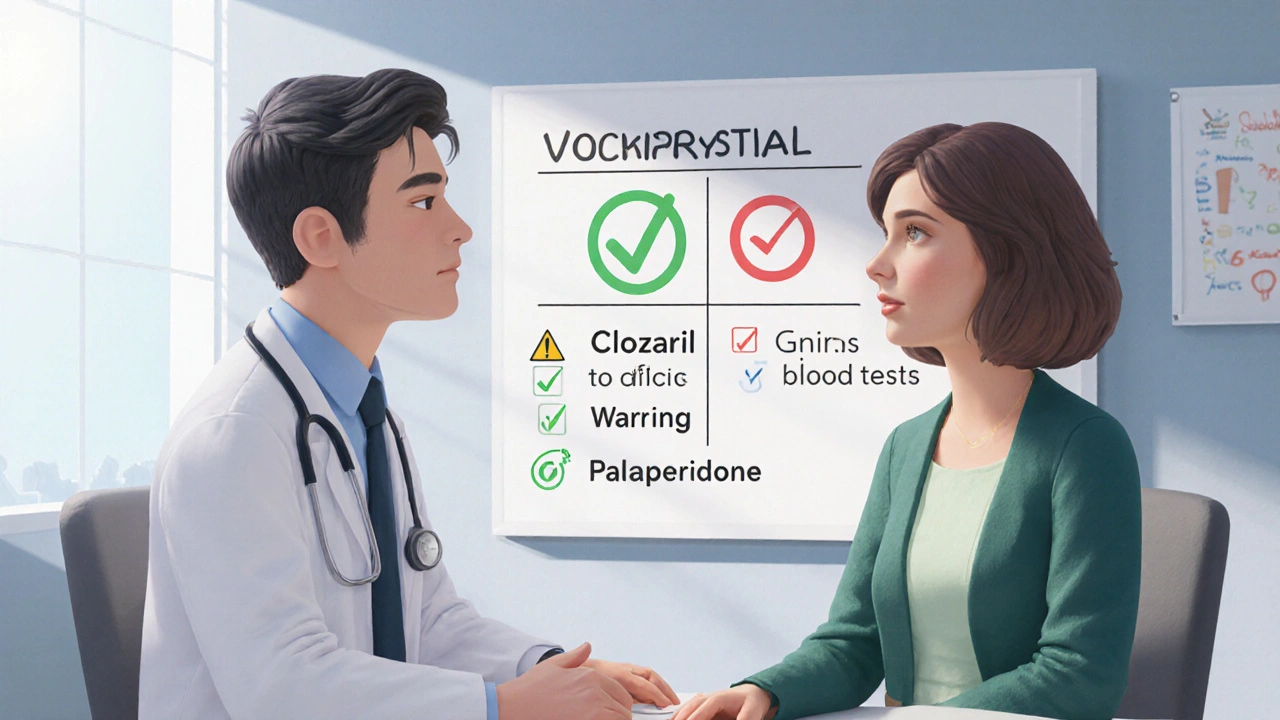Clozaril (clozapine) isn’t your typical antipsychotic. While most schizophrenia medications try to calm hallucinations and delusions, Clozaril is often the last resort - and for good reason. It’s the only drug proven to work when everything else has failed. But it’s not simple. It carries serious risks, requires weekly blood tests, and demands close monitoring. So when doctors say, "Try Clozaril," what are you really signing up for? And are there better or safer options out there?
Why Clozaril Is Different
Clozapine, the active ingredient in Clozaril, works differently than other antipsychotics. Most drugs like risperidone or olanzapine block dopamine receptors in the brain. Clozapine does that too - but it also affects serotonin, norepinephrine, and other neurotransmitters. This broader action is why it works for about 30% of people with treatment-resistant schizophrenia who don’t respond to anything else.
The data doesn’t lie. A 2023 meta-analysis in the British Journal of Psychiatry showed clozapine reduced psychotic symptoms by nearly 50% more than other antipsychotics in patients who’d tried at least two others without success. That’s not a small gain - it’s life-changing for people who’ve spent years stuck in cycles of hospitalizations and relapse.
But here’s the catch: Clozaril can cause agranulocytosis - a dangerous drop in white blood cells that leaves you vulnerable to infections. That’s why the UK’s NHS and the FDA require weekly blood tests for the first six months, then every two weeks after that. It’s not just inconvenient - it’s a major barrier to starting treatment.
Common Alternatives to Clozaril
If Clozaril feels too risky or too complicated, there are other options. They’re not as powerful, but they’re easier to manage. Here are the most commonly prescribed alternatives:
- Paliperidone (Invega) - A long-acting injectable that reduces dosing frequency. Good for people who struggle with daily pills.
- Risperidone (Risperdal) - One of the oldest second-generation antipsychotics. Effective for many, but can cause weight gain and movement issues.
- Olanzapine (Zyprexa) - Similar to clozapine in effectiveness, but without the blood monitoring. Still causes significant weight gain and metabolic changes.
- Quetiapine (Seroquel) - Often used for sleep and anxiety alongside psychosis. Less effective for severe symptoms but easier to tolerate.
- Lumateperone (Caplyta) - A newer option with fewer metabolic side effects. Doesn’t cause major weight gain or high blood sugar.
None of these match Clozaril’s success rate in treatment-resistant cases. But they’re safer, easier to start, and don’t require constant lab visits. For someone just diagnosed or with milder symptoms, they’re often the first choice.
When Alternatives Might Be Better
Not everyone needs Clozaril. In fact, most people with schizophrenia never reach that point. Here’s when alternatives make more sense:
- You’ve just been diagnosed and haven’t tried at least two other antipsychotics yet.
- You have trouble sticking to weekly blood tests due to work, transport, or anxiety.
- You have a history of severe infections or immune disorders.
- You’re concerned about weight gain, diabetes, or heart issues - Clozaril raises those risks too, just differently.
- You’re older (over 65) and at higher risk for sedation, falls, or confusion.
For example, a 58-year-old man with type 2 diabetes and mobility issues might do better on lumateperone than Clozaril. Even if it’s slightly less effective, the trade-off in safety and daily life matters.
Some people also prefer long-acting injectables like paliperidone. You get a shot once a month instead of swallowing a pill every day. No daily reminders. No missed doses. That alone can make a huge difference in relapse rates.

The Real Trade-Offs: Effectiveness vs. Safety
Let’s cut through the noise. Here’s how Clozaril stacks up against the most common alternatives:
| Medication | Effectiveness in Treatment-Resistant Cases | Weekly Blood Tests Required? | Weight Gain Risk | Metabolic Side Effects | Common Side Effects |
|---|---|---|---|---|---|
| Clozaril (Clozapine) | High - 50%+ response rate | Yes - mandatory | High | High - diabetes, high cholesterol | Sedation, drooling, constipation, seizures |
| Olanzapine (Zyprexa) | Moderate | No | High | High | Sedation, dizziness, increased appetite |
| Risperidone (Risperdal) | Moderate | No | Moderate | Moderate | Tremors, restlessness, elevated prolactin |
| Quetiapine (Seroquel) | Mild to moderate | No | Moderate | Moderate | Drowsiness, dry mouth, dizziness |
| Lumateperone (Caplyta) | Moderate | No | Low | Low | Drowsiness, nausea, headache |
| Paliperidone (Invega) | Moderate | No | Moderate | Moderate | Injection site pain, weight gain, akathisia |
Look at the pattern. Clozaril wins on effectiveness - but loses on safety and convenience. The others trade power for simplicity. For many, that’s a fair swap.
What About Newer Options?
There’s growing interest in drugs like cariprazine (Vraylar) and asenapine (Saphris), but they’re not game-changers for treatment-resistant cases. Cariprazine has a longer half-life and may help with negative symptoms like apathy - but studies show it’s still less effective than clozapine in hard-to-treat patients.
One promising area is combination therapy. Some clinics now pair lower doses of clozapine with a second antipsychotic like aripiprazole. This can reduce side effects while keeping benefits. It’s not standard yet, but it’s being tested in NHS pilot programs in Manchester and Leeds.
There’s also research into genetic testing to predict who will respond to clozapine before starting. Early results suggest certain gene variants (like HLA-DQB1) increase the risk of agranulocytosis. If you’re considering Clozaril, ask if your hospital offers pharmacogenetic screening. It’s not widely available yet, but it’s coming.

How to Decide What’s Right for You
There’s no one-size-fits-all answer. But here’s a simple way to think about it:
- Have you tried at least two other antipsychotics for 6-8 weeks each without improvement? If yes, Clozaril is worth discussing.
- Can you commit to weekly blood tests for at least six months? If not, look at injectables or newer options like lumateperone.
- Do you have a history of heart disease, diabetes, or seizures? Clozaril may not be safe for you.
- Are you worried about weight gain or metabolic issues? Lumateperone or cariprazine might be better.
- Do you struggle with remembering pills? Long-acting injections could be the key.
Don’t let fear of Clozaril stop you from exploring it - but don’t rush into it either. Talk to your psychiatrist about your lifestyle, your health history, and what matters most to you. Is it staying out of hospital? Reducing hallucinations? Keeping your job? Your goals shape the best choice.
What Happens If Clozaril Doesn’t Work?
Even Clozaril fails for about 20-30% of people with treatment-resistant schizophrenia. If that’s you, options narrow - but they don’t disappear.
Some clinicians now use electroconvulsive therapy (ECT) alongside medication. A 2024 study in The Lancet Psychiatry showed ECT improved symptoms in 45% of clozapine non-responders. It’s not a cure, but it can break a cycle.
Other options include high-dose antipsychotics (with extreme caution), experimental drugs in clinical trials, or community-based psychosocial support like cognitive behavioural therapy for psychosis (CBTp). Support groups, housing assistance, and employment programs can be just as vital as medication.
The goal isn’t just to silence voices - it’s to help you live. Sometimes that means combining medicine with therapy, routine, and community.
Is Clozaril more effective than other antipsychotics?
Yes - but only for people who haven’t responded to at least two other antipsychotics. For treatment-resistant schizophrenia, Clozaril works in about half of cases where other drugs failed. For others, it’s no better than alternatives.
Why do I need weekly blood tests for Clozaril?
Clozaril can cause agranulocytosis - a sudden drop in white blood cells that makes you vulnerable to life-threatening infections. Weekly blood tests catch this early. The risk is highest in the first 18 weeks, but monitoring continues for as long as you take the drug.
Can I switch from Clozaril to another antipsychotic?
Yes - but it must be done slowly and under medical supervision. Stopping Clozaril suddenly can cause rebound psychosis or withdrawal symptoms. Your doctor will gradually reduce your dose while introducing a new medication, usually over 4-8 weeks.
Do any alternatives have the same effectiveness as Clozaril?
No current alternative matches Clozaril’s success rate in treatment-resistant cases. Some newer drugs like lumateperone have fewer side effects, but they’re not stronger. Clozaril remains the gold standard for the hardest-to-treat cases.
What are the long-term risks of taking Clozaril?
Long-term use can lead to weight gain, high blood sugar, high cholesterol, and increased risk of heart disease. There’s also a small risk of seizures and myocarditis (heart inflammation). Regular monitoring for these issues is part of standard care - and often managed by a specialist team.
Final Thoughts: It’s Not About the Drug - It’s About Your Life
Clozaril isn’t a miracle drug. It’s a tool - powerful, risky, and demanding. But for some, it’s the only thing that brings back control. For others, safer alternatives offer enough relief without the burden.
The best choice isn’t the one with the strongest label. It’s the one that fits your life - your schedule, your health, your fears, and your goals. Talk to your doctor. Ask questions. Bring a friend to appointments. Research your options. You deserve a treatment plan that doesn’t just manage symptoms - it helps you live.


Jillian Fisher
October 29, 2025 AT 08:13I’ve been on clozapine for 3 years. The blood tests suck, but I haven’t been hospitalized since starting it. I used to hear my dead mom yelling at me every night. Now? I sleep through the night. It’s not perfect - I drool like a toddler and need a nap after lunch - but I’m back at work. Worth it.
Rachel Marco-Havens
October 29, 2025 AT 16:45People act like clozapine is some magic bullet but nobody talks about how it turns you into a lazy, drooling zombie who can’t function without 4 naps a day. And don’t even get me started on the weight gain. If you’re not willing to sacrifice your health for a 50% improvement, you’re not serious about recovery. This isn’t a spa day - it’s war.
Kathryn Conant
October 30, 2025 AT 14:13Let me tell you something - if you’re still on risperidone after two failed trials, you’re not trying hard enough. Clozapine isn’t scary - it’s the only thing that gives you back your damn life. I’ve seen people come out of catatonia on it. I’ve seen them hug their kids again. That’s not a drug - that’s a second chance. Stop being afraid and start fighting.
j jon
October 31, 2025 AT 01:21My cousin took clozapine. He lost 40 pounds in 6 months and got his job back. The blood tests were rough at first, but his nurse came to his house. That’s the key - support matters more than the pill.
Jules Tompkins
November 1, 2025 AT 14:26So clozapine basically turns you into a walking medical experiment? That’s wild. I’d rather hear voices than have to schedule my life around a needle in my arm every Monday. Like… is this treatment or a cult?
Richard H. Martin
November 2, 2025 AT 07:42Why are we letting Big Pharma push this dangerous drug on Americans?! The FDA is in bed with the pharmaceutical giants - they know clozapine causes heart damage and still approve it! This is a cover-up! I’ve read the documents - they buried the data! Wake up, sheeple!
Kshitij Nim
November 3, 2025 AT 23:35I work with patients on clozapine in Delhi. Many avoid it because they can’t afford transport for weekly blood tests. But when they start - even with support - it changes everything. The problem isn’t the drug. It’s the system. We need mobile clinics. We need subsidies. We need to stop treating mental health like a luxury.
jennifer sizemore
November 5, 2025 AT 05:41My sister was on clozapine for 8 years. She had a seizure once, but she also got married and adopted a dog. I think the real question isn’t whether it’s dangerous - it’s whether you’re willing to live with the risk to feel human again. I’d take the drooling over the silence any day.
matt tricarico
November 5, 2025 AT 09:13Of course you’d prefer lumateperone - it’s the pharmaceutical industry’s answer to people who want the illusion of safety without the commitment. Clozapine is the only drug that acknowledges the severity of treatment-resistant schizophrenia. The rest are just Band-Aids on a severed artery. You’re not ‘managing’ illness - you’re delaying collapse.
Patrick Ezebube
November 7, 2025 AT 00:03They want you on clozapine because it makes you docile. The government uses the blood tests to track you. The white blood cell drops? That’s not a side effect - it’s a signal. They’re draining your energy so you can’t organize. Don’t trust the system. They don’t want you well - they want you quiet.
Kimberly Ford
November 8, 2025 AT 20:17For anyone considering clozapine: find a specialist clinic that offers home blood draws. Most hospitals have partnerships with mobile phlebotomy services. Also - get a nutritionist. The metabolic side effects are real, but manageable. And don’t skip the ECGs - myocarditis is silent until it’s not. You’re not alone in this.
jerry woo
November 9, 2025 AT 15:43Let’s be real - clozapine isn’t a treatment. It’s a behavioral modification tool disguised as medicine. They don’t care if you live - they care if you stop screaming in public. The fact that you need weekly blood tests to stay alive is a feature, not a bug. It keeps you compliant. And guess what? That’s exactly what the system wants.